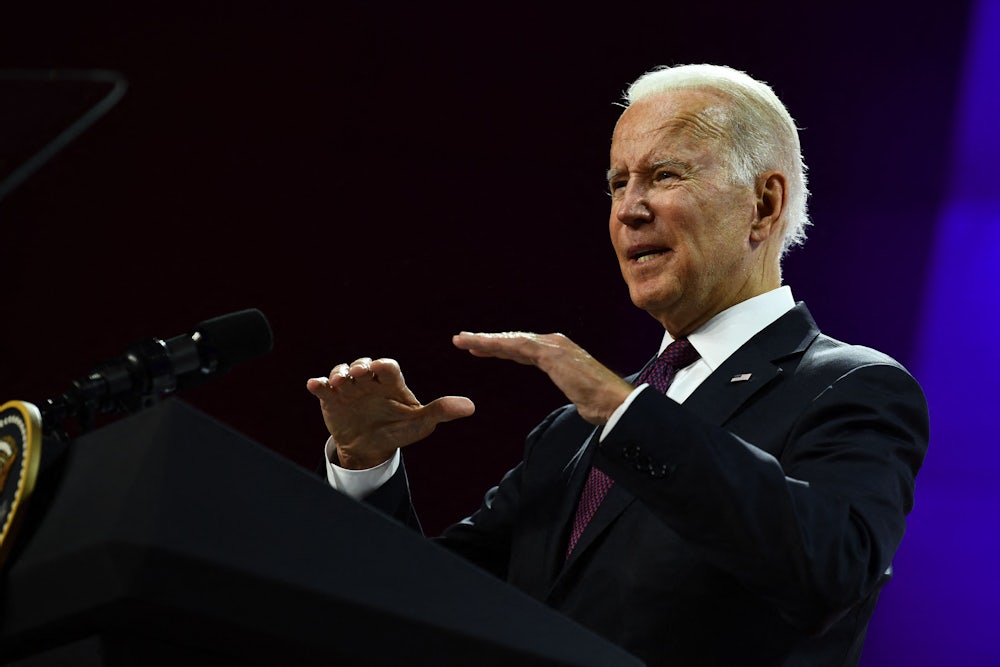The French Revolution arrived on Capitol Hill last week. One by one, popular programs in the Biden spending plan were forced to march to the guillotine erected to placate Joe Manchin and Kyrsten Sinema. The $3.5 trillion price tag. Whap. Free community college. Whap. Dental and vision coverage under Medicare. Whap. Parental and family leave. Whap.
Even after the beheadings, Manchin and Sinema still seemed dissatisfied. So taking Sisyphus as their role model, Nancy Pelosi and Chuck Schumer will try yet again this week to pass the $1 trillion infrastructure plan and reach final agreement on Biden’s downsized $1.75 trillion spending package.
Democratic despair fills the air along with a sense of betrayal. Rage at the often inscrutable demands of Manchin and Sinema has morphed into grumbling over the futility of electoral politics. A recent Guardian story was headlined, “Biden faces wrath of disappointed supporters.” The New York Times captured the glum Democratic mood: “Mr. Biden has let down some supporters who believed he could deliver on his soaring rhetoric about the need for better higher education, expanded Medicare services and bold advances in the fight against climate change.”
These claims of broken Biden promises encourage Democratic defeatism. But they also reflect a dangerous misunderstanding of both the victorious Biden 2020 campaign and the realities of electoral politics.
Remember that the 2020 campaign, more than anything, was a referendum on Donald J. Trump. Biden’s announcement video was built around his horror at the 2017 Charlottesville protests “as Klansmen and white supremacists and neo-Nazis come out in the open, their crazed faces illuminated by torches, veins bulging, and bearing the fangs of racism.”
Policy promises were, of course, part of the Biden campaign. But from his early 2019 appearances in Iowa and New Hampshire to Election Day 2020, Biden made clear that traditional Democratic issues were less important to him than erasing the stain of Trumpism and the hatred that goes with it. In the most important speech of his campaign to the Democratic convention, Biden defined the election as a “battle for the soul of the nation.” That line was so important to Biden that he repeated it three times in separate portions of the address. Meanwhile, rather than stressing detailed promises about free college and parental leave, in the speech Biden talked vaguely about creating a nation where “cost doesn’t prevent young people from going to college” and “a childcare and eldercare system … makes it possible for parents to go to work.”
The pandemic was raging in the summer of 2020, and no issue was more important than Trump’s erratic and tragic response. Beyond the lives lost from the pandemic, there was also the human toll of jobs lost with the nation facing a double-digit unemployment rate.
Those disappointed in Biden’s performance in the White House might pause to remember the $1.9 trillion stimulus package that Biden signed into law in March, which dramatically expanded the child tax credit, boosted jobless benefits, and authorized $1,400 hardship payments to Americans at or below the median income. The unemployment rate fell from 6.3 percent when Biden was inaugurated to 4.8 percent today. Biden also presided over the continuing vaccine rollout that has been marred by Republican obstructionism and right-wing conspiracy theorists.
A presidential campaign is not a binding legal document. When Biden spoke of legislation during the campaign, it was with the assumption that the Democrats would have breathing room in the Congress. Senate polls in particular were deceptive, with Democrats believing to the last that they were ahead in states with incumbent Republicans, primarily North Carolina (Tom Tillis) and Maine (Susan Collins)—and hoped that even Iowa (Joni Ernst) and South Carolina (Lindsey Graham) might potentially be in play. The GOP won all four of these seats, which is why Manchin and Sinema have such outsize power.
It was always folly to believe that Biden and the Democrats could top the New Deal and LBJ’s Great Society with a 50–50 Senate and just three votes to spare in the House. The White House deserves some of the blame for encouraging unrealistic expectations about what was ever possible in a Congress poised on the knife edge.
As a result, Democrats refuse to recognize their own victories. In addition to the $1.9 trillion stimulus package, Congress is poised to approve a $1 trillion infrastructure bill and, most likely, the downsized $1.75 trillion Biden spending plan. A trillion here and a trillion there—and pretty soon it adds up to real money. It might not be LBJ’s full Great Society package, but add the three bills up, and it amounts to transformational policies buttressing the social safety net and battling climate change.
The 2022 elections will be fought over far more than just the spending priorities for the next Congress. With Trump remaking the Republicans into a thuggish authoritarian party, democracy itself will be on the ballot. The Democrats may have won the opening skirmish for the “soul of America” in 2020, but the final outcome of the war is far from certain.
Left-wing frustration with Biden can turn dangerously shortsighted. Of course, Biden is neither a Marvel comics superhero nor the embodiment of political perfection. But consider the alternative. The politics of pique gets you Mitch McConnell back as majority leader in 2023. What that means, at minimum, is that no Biden pick for the Supreme Court would ever get a Senate vote. Moreover, a GOP sweep in 2022 would threaten an honest vote count for president in 2024.
Back in 1966, Vermont Senator George Aiken offered a simple success formula for Vietnam: “The United States should declare victory and get out.” This week, the Democrats should try an analogous approach in Congress. Declare both the infrastructure bill and the $1.75 trillion spending package as major victories—and get out of the doldrums to start trumpeting how that spending will improve everyday life.
Make no mistake: The future of American democracy will be on the ballot in 2022—and, to some extent, in the Virginia gubernatorial race Tuesday. The thought of a gleeful Trump and McConnell should make any Democrat, from left-wing activists to cautious moderates, recoil in horror. Electoral politics requires patience and perspective as much as passion and principle. That’s why, less than a year after Biden’s election, Democrats should get off the window ledge and, instead, take a moment to glory in how far America has come since January 20.










